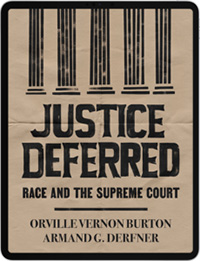Alumnus examines race and the Supreme Court in ‘Justice Deferred’
Orville Vernon Burton ’69, the Judge Matthew J. Perry Distinguished Chair of History and a professor of sociology, anthropology, computer science and pan-African studies at Clemson University, said that – despite his considerable scholarly achievements, serving as president of the Southern Historical Association and the Agricultural History Society, and including several prize-winning books of history – he, and actually any historian, couldn’t have written this book alone; and neither could a legal scholar or lawyer have written this history alone.
It took a legal scholar as well as a historian to write “Justice Deferred,” said Burton, who co-authored the book with Armand Derfner, the Distinguished Scholar in Constitutional Law at the Charleston School of Law and a renowned civil rights attorney whose Supreme Court cases helped shape the Voting Rights Act of 1965.
“Justice Deferred,” published in 2021 by Harvard University Press, was the topic of a lecture Burton delivered in Plyler Hall in April.
“What we have done is used the Supreme Court as a lens to look at race in the United States,” Burton said, “from before there was a United States through the confirmation of Amy Coney Barrett (in 2020). I believe that ‘Justice Deferred’ shines a powerful light on the court’s race record – a legacy that at times is uplifting, but more often is distressing and sometimes disgraceful.”

“Justice Deferred” examines the history of race in the United States through the lens of the Supreme Court.
“Justice Deferred” examines the Supreme Court’s ruling on pivotal cases such as the Cherokee Trail of Tears, Brown v. Board of Education and the Voting Rights Act. The authors pay special attention to the stories of the people who brought those cases and those who formed those rulings – and those who dissented with them.
One figure, whom Burton calls “an unsung hero,” was Charles Evans Hughes, devout son of an American Baptist preacher, who served on the Supreme Court as chief justice from 1930 to 1941. After the Supreme Court Building was completed in 1935, a guard approached Hughes to let him know that he planned to prevent Black people from eating among white people.
“So Hughes took him outside, turned him around and said, ‘What does it say over this building? “Equal justice under the law,”’ Burton quoted Hughes: “‘If you’re not comfortable with this, I think you ought to get another job.’”
Burton also took time to express his affection for his alma mater – an affection that led him and his wife, Georganne Burton, to donate an endowment to Furman’s Department of History to establish the Vera B. Burton Lecture Series. The topics of the lectures in the series will be the history of the American South, focusing on racial, social or economic inequities; the history of religion; and rural studies.
The lecture series is named in honor of Burton’s mother, who played a crucial role in directing his educational path. The future scholar, author and professor of history, as a young man in Ninety Six, South Carolina, did not originally want to attend Furman, instead planning to enter the U.S. Naval Academy. When news came that his Congressional sponsor was delaying his appointment for a year, Vera Burton saw an opportunity.
“My mother loved Furman, and she loved Baptists,” Burton said. “She literally prayed me into Furman, I would say. My mother didn’t finish high school, but she was a smart person and the best educated I’ve ever known.”
It was the right decision, said Burton.
“This is what I love about Furman: It’s about learning, and learning beyond the classroom,” he said. “Furman University changed my life in extraordinary ways.”